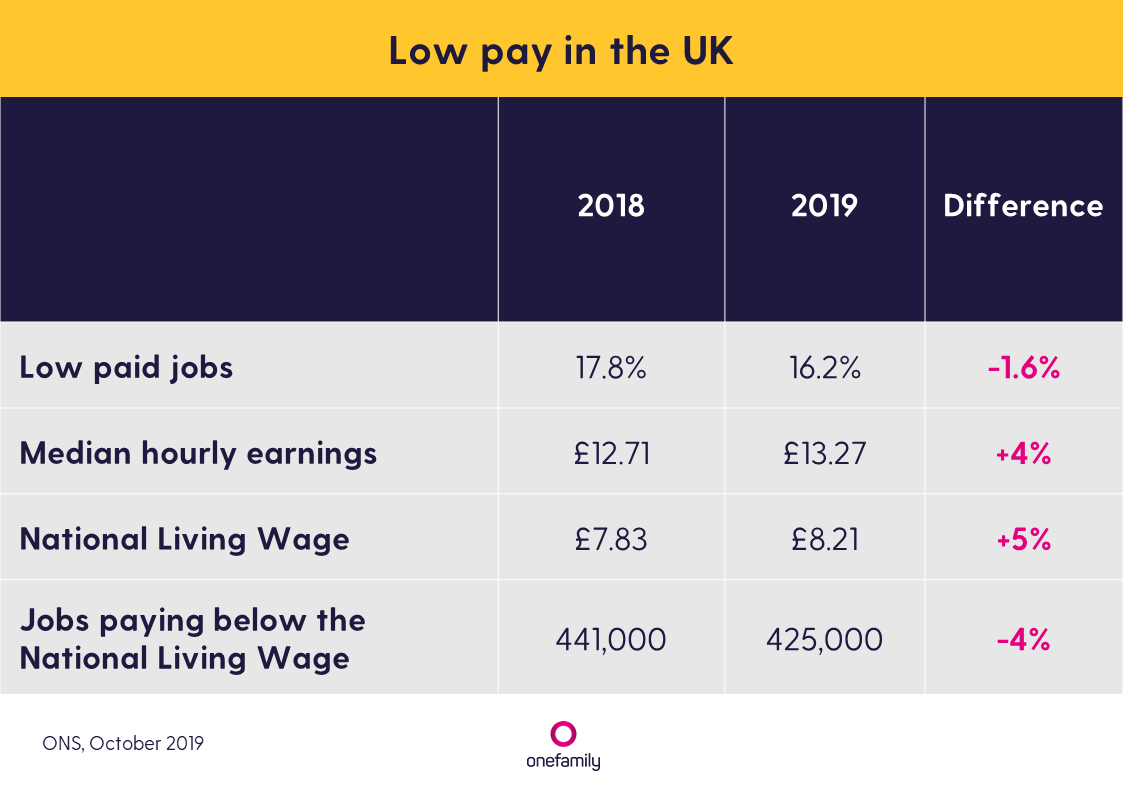Is low pay a thing of the past?
11 Nov 2019

According to the latest data the proportion of UK jobs classed as ‘low paid’ has shrunk to 16.2%, the lowest proportion since 1997.
What’s behind this trend? And how can we continue to reduce wage inequality?
What is low pay?
Low pay is defined by the Organisation for Economic Co-operation and Development as pay less than two-thirds of median hourly earnings.
According to the Office for National Statistics in 2019 median hourly earnings for all jobs is £13.27. That means jobs paying below £8.85 an hour are considered low paid.
Low paid jobs are on the way out
The proportion of low paid jobs has dropped from 17.8% in 2018 to 16.2% in 2019. And the number of jobs paying below the National Living Wage has dropped 4% to 425,000.

The decrease was most marked in London and Scotland, where the proportion of low paid jobs more than halved between 2000 and 2019.

Here in the South East the proportion of low paid jobs decreased 45% to 13.9% between 2000 and 2019.
Why is this happening?
The drop in the proportion of low paid jobs is thought to be thanks to the 4.4% rise in the National Living Wage to £7.83 back in April 2018. Hopefully the subsequent 4.5% increase to £8.21 in April 2019 means the trend is set to continue.
That’s not to mention the number of businesses who are voluntarily pledging to pay the Real Living Wage, which is £9 per hour, as defined by the Living Wage Foundation. The real Living Wage is based on the real cost of living, rather than arbitrary targets or political point-scoring.
There are now more than five thousand Living Wage Employers in the UK, including more than a third of the FTSE 100 and household names like Ikea, Aviva and Nationwide. 570 of them are in Brighton and Hove including Brandwatch, Brighton & Hove Albion and OneFamily.
What’s next?
While we wait to see how the latest Living Wage rise impacts the proportion of the UK considered as ‘low paid’, how can we keep this trend continuing into 2020 and beyond?
With a general election looming, what do our political parties say about low pay?
Labour
Labour’s strap line “for the many, not the few” promises a fairer deal for all workers.
Labour have pledged to instate a £10 an hour National Living Wage if they get elected, and for it to extend to those under the age of 18, who currently enjoy a minimum wage less than half that (£4.35 per hour).
In their manifesto they also claim they will:
- Ban zero-hour contracts.
- Allow those on short hours contracts the right to a regular contract that reflects their actual working hours.
- Establish a maximum pay ratio of 20:1 for public sector and companies bidding for public contracts.
- Ban unpaid internships.
You can find out more about Labour’s pledges on labour.org.uk.
Conservatives
The Conservatives have pledged to increase the National Living Wage to £10.50 over five years, and extend it to everyone over 23 by 2021 and 21 by 2024.
Whether this project means, as Chancellor of the Exchequer Savid Javid claimed, that the Conservatives are the “workers’ party” remains to be seen.
Find out more about the Conservatives’ National Living Wage commitments and election manifesto on conservatives.com.
Liberal Democrats
The Liberal Democrats are leading with a ‘we must stop Brexit’ manifesto, but what have they got to say about low pay?
In their manifesto they commit to:
- Establish a ‘good employer’ kitemark for companies that pay a living wage, avoid unpaid internships and use name-blind recruitment processes.
- Launch an independent review to consult on setting a genuine Living Wage, to be paid by central government departments and agencies, with other public sector organisations encouraged to do the same.
- Force employers to publish the number of people paid less than the Living Wage, as well as the ratio between top and median pay.
- Modernise employment rights to cater for the gig economy.
- Stop abuse of zero-hour contracts by creating a formal right to request a fixed contract, and consult on a right to make regular work patters contractual over time.
- Consolidating employment rights enforcement agencies and scrapping employment tribunal fees.
Find out more about the Liberal Democrats’ manifesto at libdems.org.uk.
Green
The Green Party have also made significant pledges relating to low pay. They want to:
- Establish a four-day working week to improve productivity and work-life balance. We need to “break open the week and grow the weekend”.
- Pay everyone in the UK a Universal Basic Income to do away with “the current complex, divisive and hugely expensive system of benefits and tax allowances”.
- End workplace exploitation by ensuring a Real Living Wage for all regardless of age, ban zero-hour contracts and exploitative unpaid internships.
- Establish a maximum pay ratio for organisations of 10:1 between the best and worst paid.
Find out more about the Green Party manifesto at greenparty.org.uk.
Brexit
They don’t have much to say about low pay or creating a fairer deal for workers. Who would have guessed!

Please login to comment.
Comments